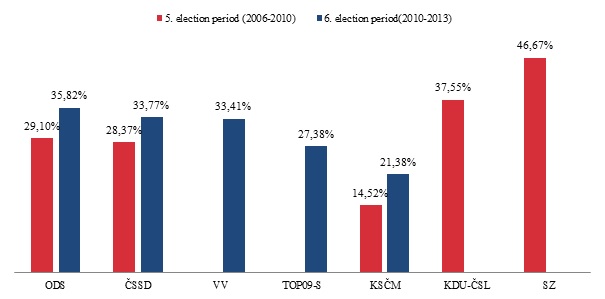The short answer is no; it has become even worse. A few months ago I outlined some figures describing the abysmal attendance of members (deputies) of the Chamber of Deputies of the Parliament of the Czech Republic[1] during committee sessions in the fifth election period (2006-2010).[2] Unfortunately, inspection of their attendance in the sixth election period (2010-2013) painted an even grimmer picture.
The committees are the key bodies where particular bills are debated and amended. They are created by the Chamber of Deputies of the Parliament and their sessions are supplemented by the attendance roll. It should be noted that, while the attendance roll provides information about the deputies’ absenteeism, mere attendance does not necessarily mean active participation during discussions. Nevertheless, given the relatively insignificant membership of the particular committees, free-riding should not be that easy (especially in comparison with the plenary sessions of the Parliament). Furthermore, just by mere attendance, deputies should be more informed about the bills that are being proposed. Given these arguments, attendance during committee sessions can be viewed as an important duty of every deputy.
So, how diligent were deputies during the sixth election period? In comparison with the fifth election period (2006-2010), where the deputies were absent from 28.11% of sessions, the absenteeism during the sixth election period (2010-2013) increased by 3.47 percentage point to 31.58%. Twenty-nine deputies were absent from more than 50% of the sessions (it was 21 during the fifth election period). The worst attendance was among the members of the Petition committee, with the average absences of 48.65%. That is a 3.18 percentage point increase over the fifth election period. Table 1 provides comparison of absences for the particular committees.
Table 1 – Average absences during committee sessions
| Committee | 5th election period | 6th election period |
| Petition committee | 45.47% |
48.65% |
| Public Administration and Regional Development committee | 28.38% |
41.94% |
| Election committee | 19.70% |
40.30% |
| Inspection committee | 39.35% |
35.68% |
| Budget committee | 20.23% |
34.98% |
| Science, Education, Culture, Youth and Sports committee | 31.54% |
33.73% |
| Agricultural committee | 19.44% |
31.34% |
| Constitutional committee | 27.98% |
30.21% |
| Foreign Affairs committee | 27.77% |
30.01% |
| European Affairs committee | 32.35% |
29.73% |
| Health committee | 18.46% |
29.06% |
| Economic committee | 29.45% |
27.79% |
| Environmental committee | 33.20% |
27.73% |
| Social Policy committee | 27.25% |
19.58% |
The average absences for the whole Chamber of Deputies of the Parliament have increased. However, it is not known whether that increase was driven by the political parties that were new to the government during the 6th election period, or whether the attendance of the old parties worsened as well. The following figure provides average absences for all political parties that were members of the Parliament during either of the inspected election periods. Absences of all parties that were present during both periods increased. The most significant deterioration can be observed for the communist party KSCM, whose deputies were absent from 6.86 percentage point of sessions more than in the fifth election period. Nevertheless, while the absenteeism worsened for the old parties, the new parties were not far behind.
Figure 1 – Comparison of average absences of political parties.
In conclusion, the presented numbers indicate that there is a lot of room for improvement when it comes to attendance of deputies during committee sessions. Unfortunately, considering the increased absenteeism between the two periods and the trends of other indicators measuring politicians’ performance[3], future improvement seems unlikely. Let’s hope that the newly elected deputies will prove me wrong!
[1] The Chamber of Deputies of the Czech Republic is one of the two chambers of the Parliament, the other one being the Senate. It consists of 200 members (Deputies) that serve four-year terms and are elected using the party-list proportional representation system.
[2] http://4liberty.eu/measuring-politicians-performance/
[3] http://4liberty.eu/changes-in-political-culture-in-the-czech-republic/



